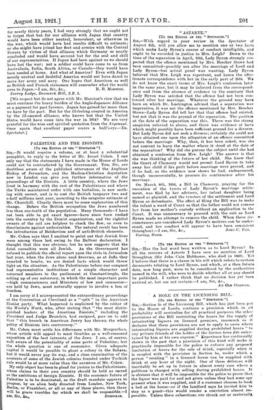" ASTARTE."
[To THE EDITOR Or THE " SPECTATOR."] Sia,—With regard to your review in the Spectator of August 6th, will you allow me to mention one or two facts which make Lady Byron's course of conduct intelligible, and ought to be recorded in justice to Mrs. Leigh? Down to the time of the separation in April, 1816, Lady Byron strongly sus- pected that the offence mentioned by Mrs. Beecher Stowe had been committed—possibly not after the marriage of Lord and Lady Byron—but actual proof was wanting. Lady Byron believed that Mrs. Leigh was repentant, and hence the affec- tionate correspondence with her in the early part of 1816. We do not know the exact terms of Mrs. Leigh's confession later in the same year, but it may be inferred from the correspond- ence and from the absence of evidence to the contrary that Lady Byron was satisfied that the offence had not been con- tinued after her marriage. Whatever the ground may have been on which Dr. Lushington advised that a separation was imperative, it was not the offence mentioned by Mrs. Beecher Stowe—Lady Byron did tell her that that offence had existed, but not that it was the ground of the separation. The position at the date of the separation was this. There was the strong suspicion referred to above, and there was evidence of facts which might possibly have been sufficient ground for a divorce. But Lady Byron did not seek a divorce; certainly she could not have obtained one upon the allegation of an offence committed before the marriage. Why, then, it has been asked, was she not content to leave the matter where it stood at the date of the separation? Why did she pursue the subject until she had obtained a confession from Mrs. Leigh? The answer is that she was thinking of the future of her child. She knew that the Court of Chancery would not permit Lord Byron to take away her child if his guilt before marriage were proved, and if he had, as the evidence now shows he had, endeavoured. though unsuccessfully, to procure its continuance after his marriage.
On March 8th, 1816, a Bill in Chancery, praying for the
execution of the trusts of Lady Byron's marriage settle- ment, was filed by her advisers, her infant daughter being named as plaintiff, and the trustees of the settlement and Lord Byron as defendants. The effect of filing the Bill was to make the infant a ward of Court so that the father could not remove her from her mother's custody without an application to the Court. It was unnecessary to proceed with the suit as Lord Byron made no attempt to remove the child. When these cir- cumstances are considered Lady Byron's motives can be under- stood, and her conduct will appear to have been consistent


































 Previous page
Previous page